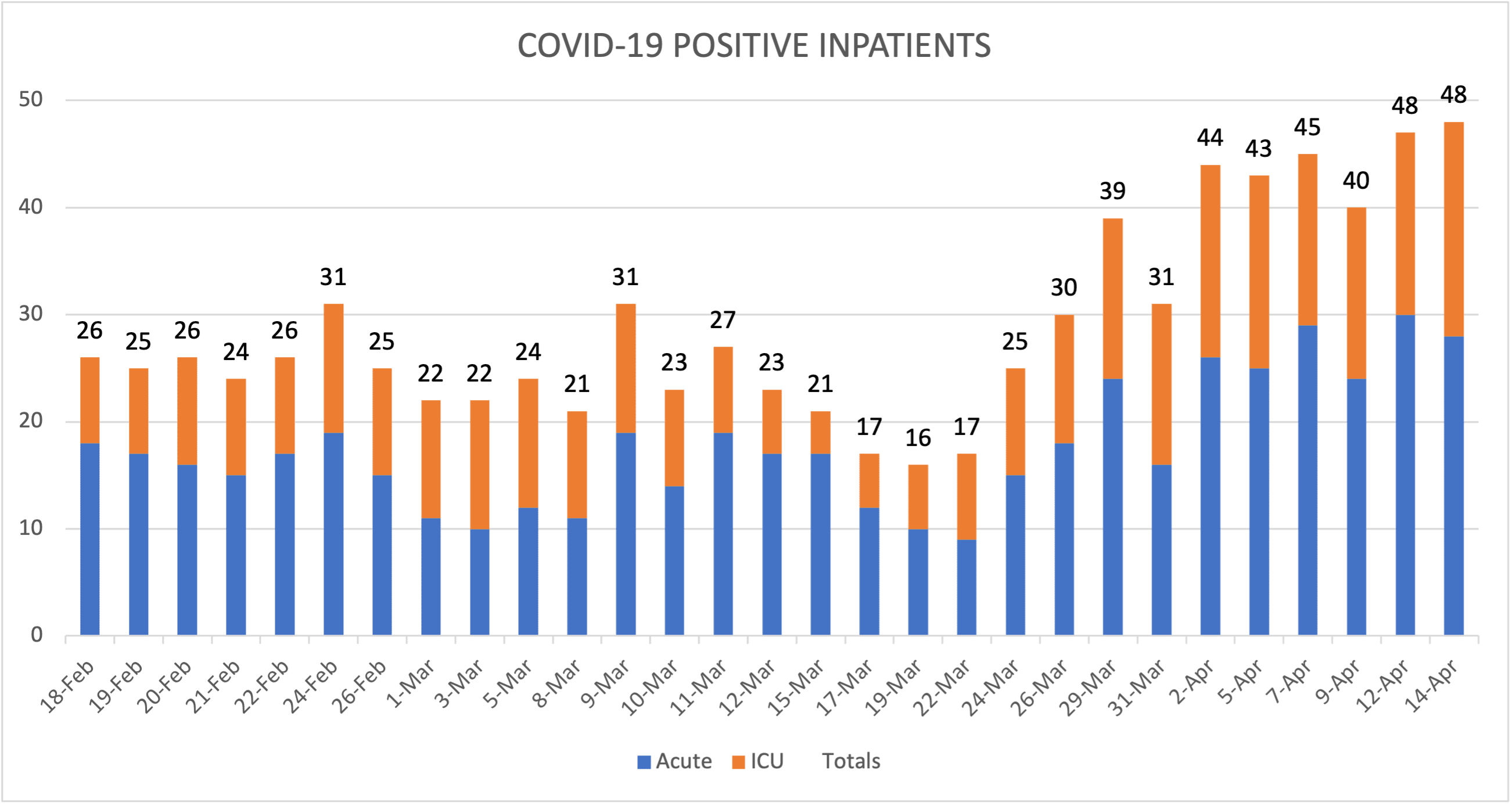Data Snapshot
UW Medicine Hospitals:

King County: The county reported 354 new positive cases and 3 new death on April 14.
Washington: The state reported 354,201 cases and 5,357 deaths as of April 13.
United States: The CDC reports 31,231,869 cases and 561,356 deaths as of April 15.
Global: WHO reports 137,866,311 confirmed COVID-19 cases and 2,965,707 deaths as of April 15.
Numbers update frequently, please follow links for most up-to-date numbers.
UW Medicine COVID-19 Vaccine Distribution Update
Total Vaccine Doses Administered: 211,607
- Total first dose: 117,383
- Total second dose: 94,224
As of April 13, 2021.
UW Medicine in the News
Today: Health officials try to ease concerns about Johnson & Johnson vaccine
Featuring: Geoffrey Baird, Laboratory Medicine
“The CDC is calling an emergency meeting Wednesday to review the Johnson & Johnson single-shot vaccine, now on pause after rare reports of blood clots in women. The White House is still confident the vaccine rollout will go on uninterrupted. NBC’s Tom Costello reports for TODAY.”
Crosscut: After COVID, brain fog lingers. UW researchers are finding out why
Featuring: William Banks, Gerontology
“Last December, Banks and his roughly 15-person research team published a study in Nature Neuroscience that showed the possible path this respiratory virus travels to cause fuzziness in the brain. Follow-up studies are needed to verify their hypothesis, but the gist is that the SARS-CoV-2 virus — which causes COVID-19 — can enter the brain by using the spikelike S1 proteins that cover it to pierce the blood-brain barrier that protects it. The blood-brain barrier is a semipermeable membrane filter that allows some microscopic nutrients (like glucose, water and amino acids) to pass from the bloodstream into the fluid surrounding the central nervous system. That process affects the firing of neurons, which carries the brain’s messages throughout the body.”
Seattle Weekly: King County residents needed for first respiratory study using Apple watches
Featuring: UW Medicine, Brotman Baty Institute
“Your Apple Watch could help tell more than just the time. Researchers at the University of Washington are seeking King County residents to participate in a respiratory health study using data collected from Apple Watches. The study examines if, and how, an Apple Watch can detect early warning signs of acute respiratory infections, such as COVID-19 and flu, according to UW Medicine’s Brotman Baty Institute. This intersection of health and technology to explore how physiological changes detected by Apple Watch will be the first study of its kind, allowing researchers to draw a relationship between associated symptoms, signals from Apple Watch and iPhone, and test results for COVID-19. The six-month study is particularly focused on people of color and frontline workers who reside in King County cities, prioritizing participants who may have increased risk of respiratory illness because of frequent exposure to others through work, health conditions, or other factors and activities.”
COVID-19 Literature Report
COVID-19 Literature Situation Report is a daily (M-F) newsletter put together by the Alliance for Pandemic Preparedness that provides a succinct summary of the latest scientific literature related to the COVID-19 pandemic.
Key Takeaways: COVID-19 Literature Situation Report April 13, 2021
- Prior SARS-CoV-2 infection was associated with an 84% lower risk of infection according to the SIREN Study, a large cohort study of over 25,000 individuals. From June to December 2020, reinfections/infections were detected in 0.02% (155 of 8,278) of participants positive at baseline compared to 0.1% (1,704 of 17,383) of participants negative at baseline. The authors found no evidence that the emergence of the B.1.1.7 variant was linked to increased reinfection rates. More.
- Infections with the B.1.1.7 variant of SARS-CoV-2 likely cause similar symptoms compared to pre-existing strains, according to an analysis of data from the COVID-19 Symptom Study obtained during a period when the B.1.1.7 variant was surging in the UK (September to December 2020). Types of symptoms, duration of symptoms, and reinfection rate were comparable to data obtained during outbreaks with pre-existing strains. More.
- Vaccine-induced IgG antibodies were present in 97% of breastmilk samples from breastfeeding women 6 weeks after receiving the first dose of the Pfizer-BioNTech vaccine in a cohort study in Israel. No mothers or infants experienced any serious adverse events during the study period. More.
- In a randomized, open-label trial of outpatients with COVID-19, the inhaled glucocorticoid budesonide reduced the rates of seeking medical attention or hospitalization when initiated within seven days of symptom onset. More. In a separate open label trial involving older adult outpatients within fourteen days of symptom onset, budesonide reduced the time to recovery by 3 days. More.
COVID-19 Literature Surveillance Team, is an affiliated group of medical students, PhDs and physicians keeping up with the latest research on SARS-CoV-2 / COVID-19 by finding the newest articles, reading them, grading their level of evidence and bringing you the bottom line.
Read the latest report: April 14 | Daily COVID-19 LST Report.
Tweet of the Week
Dr. Tim Dellit @UWMedicine says that younger people are being hospitalized with severe #COVID-19 illness. We have 48 total patients with COVID-19 at our four hospitals. Please continue to mask and follow safety protocols. @harborviewmc @PatrickQuinnTV https://t.co/D86BgtZbCu
— UW Medicine Newsroom (@uwmnewsroom) April 15, 2021
